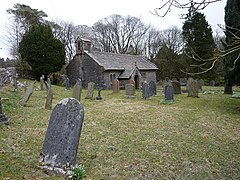History
The hamlet is situated on the B6255 road between Ingleton and Ribblehead near to the Ribblehead Viaduct. The name derives from Old French and literally means Chapel in the valley. [1] It was first recorded as Chappell ith Dale in 1677. [2] Historically, the hamlet, and its parish, were both in the Wapentake of Ewcross and up until 1974, they were in the West Riding of Yorkshire. [3] [4] In 1892, the hamlet was recorded as having a population of 150. Modern-day population statistics are recorded within the Civil Parish of Ingleton. [5] [6]
The hamlet is in close proximity to Ingleborough and Whernside and there are several potholes in the vicinity, [7] the best known being Great Douk Cave. There is a pub in the village, The Old Hill Inn, which is used as a starting and ending point for various walks on Whernside or Ingleborough. [8] The source of the River Doe is nearby.
St Leonard's Church, Chapel-le-Dale is a grade II listed building. It was used as a burial plot for the navvies, and their family members, who died whilst constructing the nearby Ribblehead Viaduct between 1869 and 1876. In all, over 200 people died during the construction from accidents and outbreaks of smallpox. A plaque was erected in the church to their memory. [9] [10] [11] Previous to the railway's construction, deaths and burials in the dale numbered between two and four people each year on average. A survey of the parish records from 1876 showed the average of 44 burials per year between 1870 and 1875. [12]
This page is based on this
Wikipedia article Text is available under the
CC BY-SA 4.0 license; additional terms may apply.
Images, videos and audio are available under their respective licenses.

